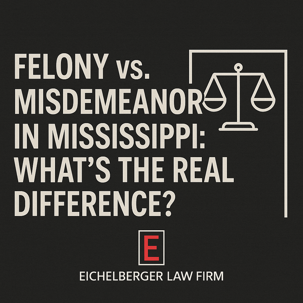The Labels Matter—And So Do the Consequences
Getting charged with a crime is serious, no matter what the charge is. But in Mississippi, there's a big difference between a felony and a misdemeanor. These labels affect how your case is handled, what penalties you face, and what your life looks like afterward.
If you're facing criminal charges, you need to understand the difference.
What Is a Misdemeanor in Mississippi?
A misdemeanor is a lower-level offense. That doesn’t mean it’s not serious. It just means the maximum jail time is 1 year or less, and the sentence is usually served in a county jail.
Examples:
Simple assault
First-offense DUI
Shoplifting under $1,000
Possession of marijuana under 30 grams
Penalties:
Up to 6 months or 1 year in jail (depending on the charge); possibly fine-only
Fines, probation, community service
Potential driver’s license suspension for certain charges
Criminal record
Misdemeanors usually move faster through the courts. In some cases, you can avoid jail through diversion programs or plea deals. But make no mistake: a misdemeanor conviction can still follow you for life.
What Is a Felony in Mississippi?
A felony is a more serious charge. It can carry more than one year in prison, and sometimes it can carry decades if not life. Felonies are prosecuted in circuit court and come with long-term consequences even after the sentence is served.
Examples:
Aggravated assault
Grand larceny (over $1,000)
Drug trafficking
Burglary
Robbery
Murder
Penalties:
Minimum 1 year in prison (and often much, much more)
Larger fines
Longer probation
Possible lifetime consequences for voting, gun ownership, and employment
Some Mississippi felony laws have mandatory minimum sentences. That means the judge has little discretion on those cases; if you're convicted, you're going to prison.
Which Court Handles the Case?
Misdemeanors usually go through municipal or justice courts.
Felonies are handled by circuit courts, where prosecutors, grand juries, and more formal procedures come into play.
This matters. Felony court involves bigger stakes, career prosecutors, and a longer process. If you're facing felony charges, you’re playing for keeps.
What About Plea Deals or Reductions?
Some felony charges can be reduced to misdemeanors or even ultimately dismissed through negotiation. That’s not guaranteed and it’s not automatic. But a skilled defense attorney can often push for a reduction, especially if:
You have no prior record
The facts are weak
The victim is uncooperative
Police overreached or mishandled evidence
On the other hand, don’t assume the prosecutor is your friend. They're not in the business of giving out second chances unless they have a reason to.
How These Labels Affect Your Life
Convictions carry consequences beyond jail time. In Mississippi:
A felony can cost you the right to vote, own a gun, or hold certain jobs for the rest of your life.
A misdemeanor can still affect housing, college, jobs, and professional licenses.
Both show up on background checks.
Final Word: Every Case Deserves a Real Defense
People think misdemeanors are “no big deal” and that felonies mean “you’re cooked.” Both are wrong.
Every case is different. Every charge deserves a real defense. Whether it’s a first-time shoplifting case or a serious felony indictment, the outcome will shape your future and your freedom.
Facing charges in Mississippi?
Call Eichelberger Law Firm at 601-202-9981. We’ll talk through what you're up against and how to fight it.

